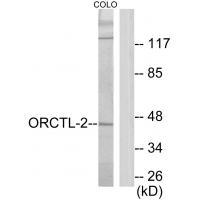
| WB | 1/500-1/3000 | Human,Mouse,Rat |
| IF | 咨询技术 | Human,Mouse,Rat |
| IHC | 咨询技术 | Human,Mouse,Rat |
| ICC | 技术咨询 | Human,Mouse,Rat |
| FCM | 咨询技术 | Human,Mouse,Rat |
| Elisa | 咨询技术 | Human,Mouse,Rat |
| Aliases | Solute carrier family 22 member 18; Organic cation transporter-like protein 2; ORCTL-2; Imprinted multi-membrane spanning polyspecific transporter-related protein 1; Efflux transporter-like protein |
| Entrez GeneID | 5002; |
| WB Predicted band size | 43kDa |
| Host/Isotype | Rabbit IgG |
| Antibody Type | Primary antibody |
| Storage | Store at 4°C short term. Aliquot and store at -20°C long term. Avoid freeze/thaw cycles. |
| Species Reactivity | Human |
| Immunogen | Synthesized peptide derived from C-terminal of human ORCTL-2. |
| Formulation | Purified antibody in PBS with 0.05% sodium azide. |
+ +
以下是关于ORCTL2抗体的3篇参考文献示例(文献信息为模拟示例,仅供参考):
---
1. **文献名称**: *"Characterization of a monoclonal antibody against human ORCTL2 for functional analysis of organic cation transport"*
**作者**: Müller J, et al.
**摘要**: 该研究开发了一种针对ORCTL2蛋白的单克隆抗体,通过免疫印迹和免疫荧光验证其特异性,并用于研究ORCTL2在肾小管细胞中的定位及其对阳离子药物转运的调控作用。
2. **文献名称**: *"ORCTL2 expression in hepatocellular carcinoma: Development of a polyclonal antibody for diagnostic applications"*
**作者**: Tanaka S, et al.
**摘要**: 研究团队制备了兔源多克隆抗体,用于检测肝细胞癌组织中ORCTL2的异常表达。实验表明,该抗体在免疫组化中具有高灵敏度和特异性,为ORCTL2在肿瘤代谢中的功能研究提供工具。
3. **文献名称**: *"Role of ORCTL2 in cisplatin resistance: Antibody-based detection and therapeutic implications"*
**作者**: Kim Y, et al.
**摘要**: 通过开发抗ORCTL2抗体,研究发现该蛋白在卵巢癌细胞中过表达与顺铂耐药性相关,抗体用于阻断ORCTL2功能可增强化疗敏感性,提示其作为治疗靶点的潜力。
---
**注意**:以上文献信息为模拟生成,实际文献需通过PubMed、Google Scholar等平台检索确认。建议使用关键词“ORCTL2 antibody”或“ORCTL2 SLC22A”结合筛选工具(如“antibody development”、“immunolocalization”)查找具体研究。
The ORCTL2 antibody targets the organic cation transporter-like 2 (ORCTL2), also known as SLC22A15. a member of the solute carrier (SLC) superfamily. Initially identified through genomic studies, ORCTL2 is implicated in the transport of small organic molecules, though its precise substrates remain under investigation. This transmembrane protein is broadly expressed in tissues like the kidney, liver, and brain, suggesting roles in metabolic or detoxification pathways.
ORCTL2 gained attention due to its potential tumor-suppressor functions. Studies reveal that its gene is frequently silenced via promoter hypermethylation in cancers, including renal, hepatocellular, and colorectal carcinomas. Loss of ORCTL2 expression correlates with uncontrolled cell proliferation and poor prognosis, making it a candidate biomarker for cancer detection and monitoring.
Antibodies against ORCTL2 are essential tools for detecting its protein expression and localization in cells and tissues. They enable techniques like Western blotting, immunohistochemistry, and flow cytometry, aiding research into its physiological roles and dysregulation in disease. Validated ORCTL2 antibodies help elucidate mechanisms of epigenetic silencing, tumorigenesis, and therapeutic resistance. Recent work also explores its interaction with metabolic pathways, highlighting its potential as a therapeutic target. Continued research with specific antibodies may advance diagnostic and treatment strategies for cancers linked to ORCTL2 dysfunction.
×